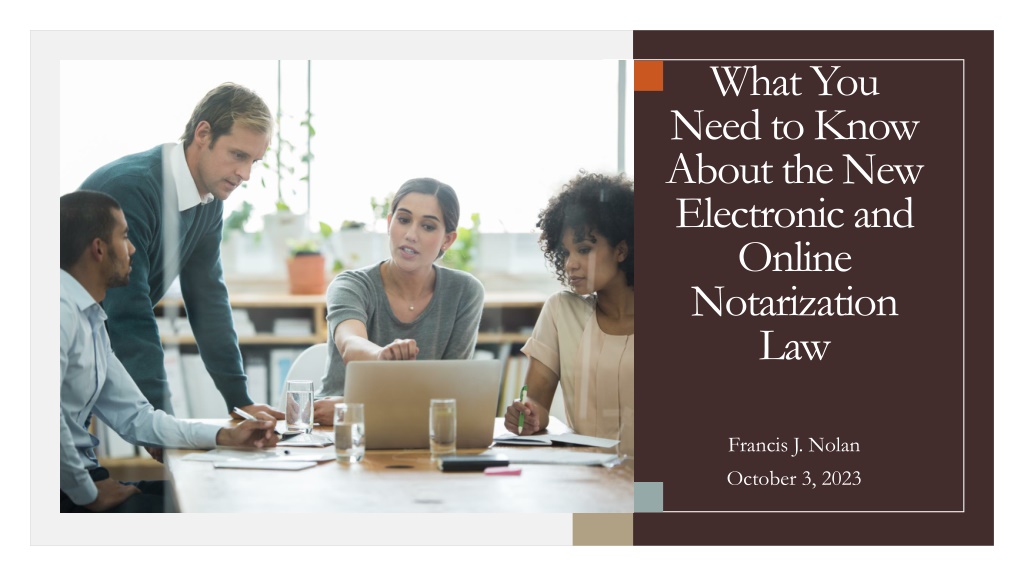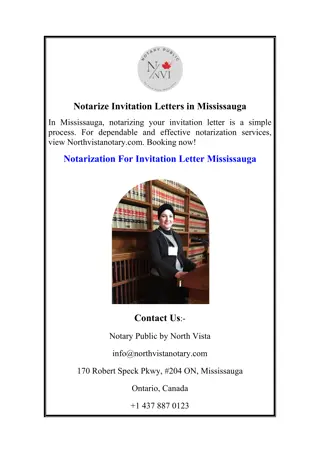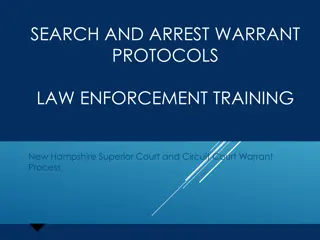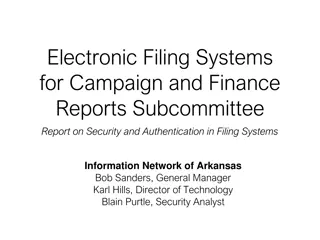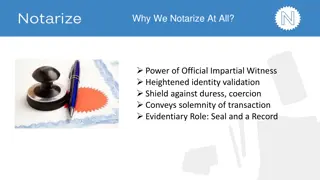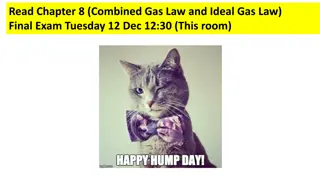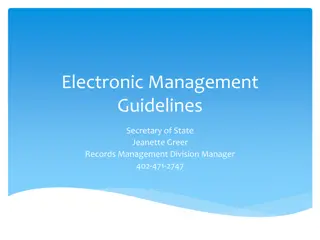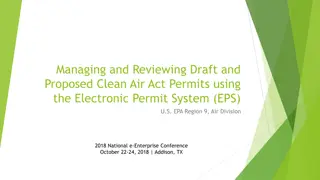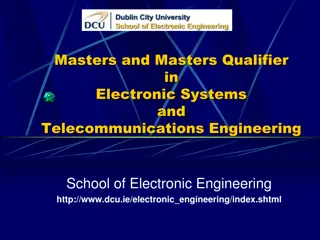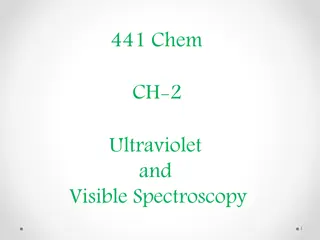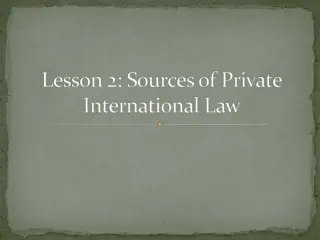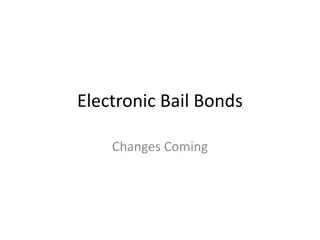Understanding the New Electronic and Online Notarization Law
The article explores the evolution of notarial acts, including Remote Online Notarization (RON), Electronic Notarization, and considerations for Unauthorized Practice of Law (UPL). It discusses the challenges and opportunities presented by electronic and remote notarization methods, as well as insights on conducting notarial acts during the COVID-19 pandemic. The content covers the traditional notarial act, requirements for identification, and the use of technology in facilitating notarization processes.
- Notarization Law
- Electronic Notarization
- Remote Notarization
- UPL Considerations
- COVID-19 Notarization
Download Presentation

Please find below an Image/Link to download the presentation.
The content on the website is provided AS IS for your information and personal use only. It may not be sold, licensed, or shared on other websites without obtaining consent from the author. Download presentation by click this link. If you encounter any issues during the download, it is possible that the publisher has removed the file from their server.
E N D
Presentation Transcript
What You Need to Know About the New Electronic and Online Notarization Law Francis J. Nolan October 3, 2023
Overview The Evolution of the Notarial Act Remote Online Notarization (RON) Introduction Electronic Notarization UPL Considerations and Notarial Misconduct What s Next? Q & A/Closing
Introduction How REBA Learned to Stop Worrying and Love the RON
The Evolution of the Notarial Act Figuring out how to conduct a closing without actually being with people
The Notarial Act as We Know It Traditional Notarial Act Notary and signatory appear together, in person Acknowledgement: signatory confirms that signature was affixed voluntarily and, if applicable, with appropriate authority in representative capacity Jurat: signatory signs in front of notary, attests to truthfulness of document s contents under oath/affirmation Satisfactory evidence of identity 1+ photo ID from federal or state government agency w/signature Oath/affirmation of credible witness personally known to both notary and signatory Personal knowledge Non-citizen: passport or other governmental photo ID w/signature showing individual s nationality
Notarizing In the Time of COVID Remote Ink-Signed Notarization (RIN) Emergency legislation adopted in 2020 in response to COVID pandemic (Ch. 71 of the Acts of 2020), expired in March 2023 Notary and signatory can be physically located in different locations within Massachusetts Electronic video conferencing used to communicate in real time Signatory discloses anyone present with the signer they must be visible to the notary Signatory presents government-issued photo ID and, for real estate documents, second form of ID (e.g. credit card, recent tax bill) to notary via video Notary observes signatory s execution of physical document during video conference Signatory sends wet-ink signed document to notary Notary conducts second video conference to verify document is the same one signatory executed and to conduct the notarial act Notary retains audio/video recording of both video conferences for 10 years Real estate: notary must be MA attorney or acting under direct supervision of MA attorney
Changes: Definitions Seal Journal UPL/Notary Misconduct Electronic Notarization Remote Notarization Except for UPL, all changes affect MGL c. 222 the chapter governing MA notaries public Effective January 1, 2024 Chapter 2 of the Acts of 2023 The RON Bill
Electronic Notarization Goodbye briefcase, hello iPad!
In-Person Electronic Notarization (IPEN) New statutory section: G.L. c. 222, s. 27 Allows notary to affix an electronic signature and seal to an electronic document Requires use of tamper-evident technology Tamper-evident: a layer of security in electronically notarized documents that provides evidence of any changes made to an electronic document after it was notarized. Example: digital certificate Notary chooses the technology platform Electronic seal must be Unique to the notary Independently verifiable Retained under notary s sole control AND Attached to or logically associated with the electronic record in tamper-evident manner
Working Backwards: Making an Electronic Record Tangible For instances in which an electronic document cannot be recorded electronically, statute allows document to be converted into a tangible copy Tangible copy must satisfy all requirements for recording an original document Notarial certificate must satisfy all requirements for an original document to be accepted for recording Notary who executed the notarial certificate must certify that the tangible copy is an accurate copy of the electronic record
Remote Online Notarization One more thing you can do without ever leaving the house
Remote Online Notarization (RON) New statutory section: G.L. c. 222, s. 28 Allows notary to effect a notarial act not just electronically, but remotely Requires use of communication technology approved by the Secretary of the Commonwealth Cannot be used to notarize the following: Record related to the electoral process Will, codicil or document purporting to be a will or codicil Only available to Massachusetts notaries acting within the Commonwealth of Massachusetts (signatories can be anywhere!) Some limitations on notarizing documents when signatory is outside of U.S.
Definitional Changes for RON In person now defined to include interacting with a remotely-located individual by means of communication technology in compliance with section 28. Various other definitions in G.L. c. 222, s. 1 updated to account for electronic as well as tangible documents Technology definitions specific to RON Capable of independent verification (re: electronic seal) Communication technology Credential analysis Dynamic knowledge-based authentication Identity proofing Remotely-located individual Satisfactory evidence of identity is different for RON transactions than for in-person transactions
Walk Before You RON First, you need to be commissioned! Register as a remote notary with the Secretary s office Inform the Secretary that you intend to perform remote notarizations Identify the communication technology you re going to use for remote notarizations If required by the Secretary, complete a training course Provide notice to the Secretary Affirming you ve read and will comply with Section 28 and all rules adopted by the Secretary Including proof you ve completed the Secretary s training, if required Identifying a usual place of business in Massachusetts or, if a foreign entity, a registered agent, and Identifying an address for service of process in connection with a civil action or other proceeding
Communication Technology Critical component of remote online notarization is the use of an approved technology platform Considerations: Ease of use Reliability Method of identity proofing Records retention (who keeps the recordings?) Cost and billing structure Do you need/want to be part of their network?
Steps in the RON Process Parties sign in to the communication technology platform Each party goes through a quick technology check to ensure they have working webcam and microphone and sufficient internet connection Signatories proceed through at least two identity proofing processes Communication technology provides notary with a means of verifying signatory s identity Parties review the document(s) to be executed Signatories affix their electronic signature Notary affixes electronic signature and seal
Verifying Identity Process of verifying signer s identity is significantly more robust than traditional verification methods Credential analysis: appropriate photo ID presented, communication technology validates through public or proprietary data sources Dynamic knowledge-based authentication (KBA): communication technology asks signer a series of personal questions drawn from public or proprietary data sources Analysis of biometric data such as facial recognition, voiceprint analysis or fingerprint analysis RON communication technology must use at least two of these identity proofing methods in order for the notary to be able to conduct the notarial act
Other RON Requirements Notary must be able to execute the notarial act in a single real-time session Notary is responsible for creating an audio-visual recording of the notarial act Audio-visual recording must be retained for 10 years Communication technology provider may have ability to retain recording for you Notary must record the act in a tamper-evident electronic journal Communication technology provider may have ability to document the act in journal form Law allows you to maintain multiple electronic journals Notary cannot use/sell/offer to sell personal info obtained through a RON transaction For real estate closings Once the signatory s identity has been verified, the communication technology platform will require the entry of the BBO number of the MA attorney overseeing the closing You can pass along the cost of using communication technology
UPL and Notary Misconduct How to stay on the right side of the practice
Keeping UPL Out of RON Transactions New statute, G.L. c. 221, s. 46E, largely codifies REBA v. NREIS decision (2011) Only a MA attorney in good standing can do the following: Direct or manage a real estate closing Give legal advice as to the legal status of title Ensure that the seller/mortgagor is in a position to convey marketable title Issue a certification of title Draft a deed to real property on behalf of someone else Ensure that documents necessary to convey title were properly executed/acknowledged Non-attorney can take this step if under the direction/supervision of a MA attorney Disburse or manage the disbursement of consideration for the conveyance
Penalties UPL violation: Attorney general can initiate action against any person or creditor engaging in pattern or practice of non- compliance Private right of action for a person having an interest or right potentially adversely affected Misconduct by remote notary: Secretary has authority to revoke notary commission Attorney General has authority to enforce Secretary s order
Whats Next? All eyes on Secretary Galvin Procedures for obtaining remote notary commission Rules regarding performance of RON notarial act Approval of communication technology providers Establishment of standards for identity proofing Land Court may promulgate rules/guidelines for recording electronic documents with respect to registered land Registries may need to adopt guidelines for recording electronic documents Are there technological limitations in existing registry systems that should be reviewed?
You: Q Me: A
Thank You! Contact me: Fran Nolan Harmon Law Offices, P.C. fnolan@harmonlaw.com (617) 558-8418
